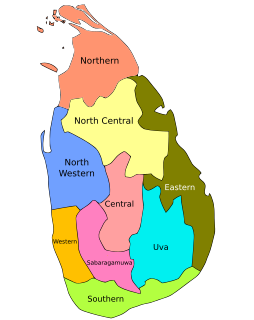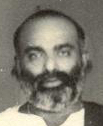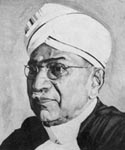Related Research Articles

Sri Lanka, formerly known as Ceylon, and officially the Democratic Socialist Republic of Sri Lanka, is an island country in South Asia. It lies in the Indian Ocean, southwest of the Bay of Bengal, and southeast of the Arabian Sea; it is separated from the Indian subcontinent by the Gulf of Mannar and the Palk Strait. Sri Lanka shares a maritime border with India and the Maldives. Sri Jayawardenepura Kotte is its legislative capital, and Colombo is its largest city and financial centre.

The history of Sri Lanka is intertwined with the history of the broader Indian subcontinent and the surrounding regions, comprising the areas of South Asia, Southeast Asia and Indian Ocean.

In Sri Lanka, provinces are the first level administrative division. They were first established by the British rulers of Ceylon in 1833. Over the next century most of the administrative functions were transferred to the districts, the second level administrative division. By the middle of the 20th century the provinces had become merely ceremonial. This changed in 1987 when, following several decades of increasing demand for a decentralization, the 13th Amendment to the 1978 Constitution of Sri Lanka established provincial councils. Currently there are nine provinces.

Batticaloa is a major city in the Eastern Province, Sri Lanka, and its former capital. It is the administrative capital of the Batticaloa District. The city is the seat of the Eastern University of Sri Lanka and is a major commercial centre. It is on the east coast, 111 kilometres (69 mi) south of Trincomalee, and is situated on an island. Pasikudah is popular tourist destinations situated 35 km (22 mi) northwest with beaches and flat year-round warm-water shallow-lagoons.
Thesavalamai is the traditional law of the Sri Lankan Tamil inhabitants Jaffna peninsula, codified by the Dutch during their colonial rule in 1707. The Thesawalamai is a collection of the Customs of the Malabar Inhabitants of the Province of Jaffna and given full force by the Regulation of 1806. For Thesawalamai to apply to a person it must be established that he is a Tamil inhabitant of the Northern Province. The Law in its present form applies to most Tamils in northern Sri Lanka. The law is personal in nature thus it is applicable mostly for property, inheritance, and marriage.

The Jaffna Kingdom, also known as Kingdom of Aryachakravarti, of modern northern Sri Lanka was a historic monarchy that came into existence around the town of Jaffna on the Jaffna peninsula. It was traditionally thought to be established after the invasion of Magha, who is credited with the founding of the Jaffna kingdom and is said to have been from Kalinga, in India. Established as a powerful force in the north, north east and west of the island, it eventually became a tribute-paying feudatory of the Pandyan Empire in modern South India in 1258, gaining independence in 1323, when the last Pandyan ruler of Madurai was defeated and expelled in 1323 by Malik Kafur, the army general of the Muslim Delhi Sultanate. For a brief period, in the early to mid-14th century, it was an ascendant power in the island of Sri Lanka when all regional kingdoms accepted subordination. However, the kingdom was eventually overpowered by the rival Kotte Kingdom, around 1450 when it was invaded by Prince Sapumal under the orders of Parakramabahu VI.

Sri Lankan Tamils, also known as Ceylon Tamils or Eelam Tamils, are members of the Tamil ethnic group native to the South Asian island state of Sri Lanka. Today, they constitute a majority in the Northern Province, live in significant numbers in the Eastern Province and are in the minority throughout the rest of the country. 70% of Sri Lankan Tamils in Sri Lanka live in the Northern and Eastern provinces.

Sri Lankan Moors are an ethnic minority group in Sri Lanka, comprising 9.2% of the country's total population. Most of them are native speakers of the Tamil language who also speak Sinhalese as a second language. They are predominantly followers of Islam. The Sri Lankan Muslim community is divided as Sri Lankan Moors, Indian Moors and Sri Lankan Malays as per their history and traditions.

Ceylon was the British Crown colony of present-day Sri Lanka between 1796 and 4 February 1948. Initially, the area it covered did not include the Kingdom of Kandy, which was a protectorate, but from 1817 to 1948 the British possessions included the whole island of Ceylon, now the nation of Sri Lanka.

Vaithianathan Navaratnam was a Sri Lankan Tamil lawyer, politician and Member of Parliament.

Vallipuram Nallathamby Navaratnam was a Sri Lankan Tamil lawyer, politician and Member of Parliament.
Suratissa was an early monarch of Sri Lanka of the Kingdom of Anuradhapura, based at the ancient capital of Anuradhapura from 247 BC to 237 BC. He was the younger son of Pandukabhaya and the brother of Mutasiva. Suratissa was defeated and killed in battle by two South Indian Tamil invaders Sena and Guttika and usurped the Sinhalese throne and became joint rules of Anuradhapura, which was the first historically reported account of Tamil rule in Sri Lanka. Sinhala rule was re-established in 215 BC.
Sri Lankan Tamils in India mainly refer to Tamil people of Sri Lankan origin in India and non-resident Sri Lankan Tamil. They are partly who migrated to India and their descendants and mostly refugees from Sri Lanka because of the concluded Sri Lankan Civil War. In general socio economically they are living below poverty line, except few people who settled in India during early times, rich businessmen, and professionals. In Tamil Nadu they are also known as Ceylon Tamils or Jaffna Tamils.
Demala Hatpattu or Demala Pattu or Demala Pattuva was a medieval and pre colonial division of Sri Lanka. It was a regional political division formed by royal land grants. There were number of such Pattus across the country. Demela Hatpattu was named as such because at its time of creation, it was exclusively governed by Tamil hereditary chiefs. The land was granted to Chiefs of Kerala Tamil Mukkuvar cheifs initially, later on given to Karava cheifs migrated from Coromandel coast for services rendered or as a result of conquest by Mukkuvas.
The Report of the Secretary-General's Panel of Experts on Accountability in Sri Lanka was a 2011 report produced by a panel of experts appointed by United Nations Secretary-General (UNSG) Ban Ki-moon to advise him on the issue of accountability with regard to any alleged violations of international human rights and humanitarian law during the final stages of the Sri Lankan Civil War. The report is referred to by some as the Darusman Report, after the name of the chairman of the panel.

Sir Waithilingam Duraiswamy was a Ceylon Tamil lawyer, politician and speaker of the State Council of Ceylon.
Alfred Leo Saverimuthu Thambiayah was a Ceylon Tamil businessman, politician and Member of Parliament.
The Government of the Northern Province refers to the provincial government of the Northern Province of Sri Lanka. Under the Sri Lankan constitution the nine provincial governments of the country have power over a variety of matters including agriculture, education, health, housing, local government, planning, road transport and social services. The constitution also gives them powers over police and land but successive central governments have refused to devolve these powers to the provinces. Legislative power rests with the Northern Provincial Council whilst executive power rests with the Governor and Board of Ministers.

Konara Mudiyanselage Podiappuhamy Rajaratne was a Ceylonese lawyer, politician and parliamentary secretary.
References
- ^ The Mukkuva law: or, The rules of succession among the Mukkuvars of Ceylon . / By C. Brito, Imprint Colombo, H. D. Gabriel, 1876